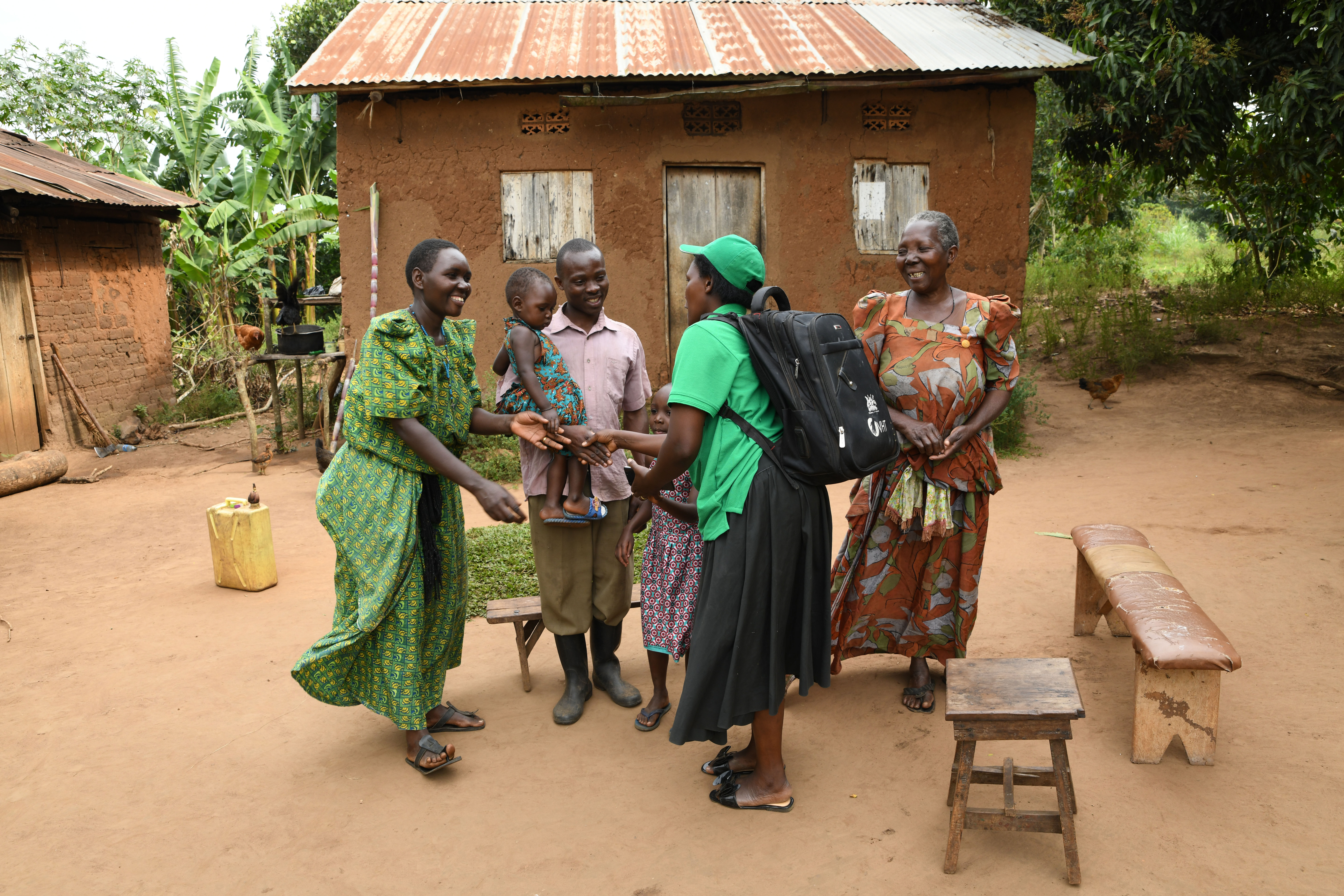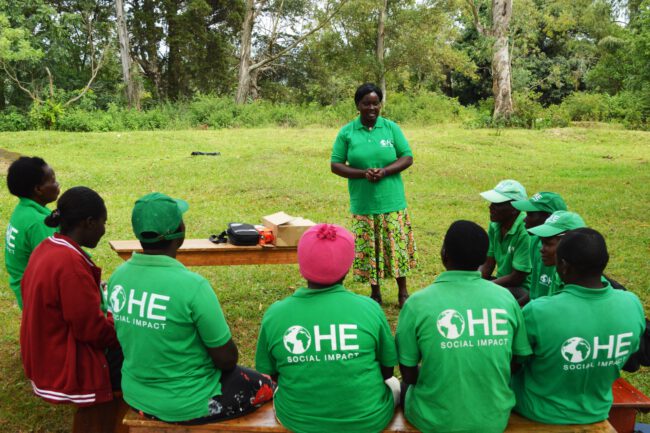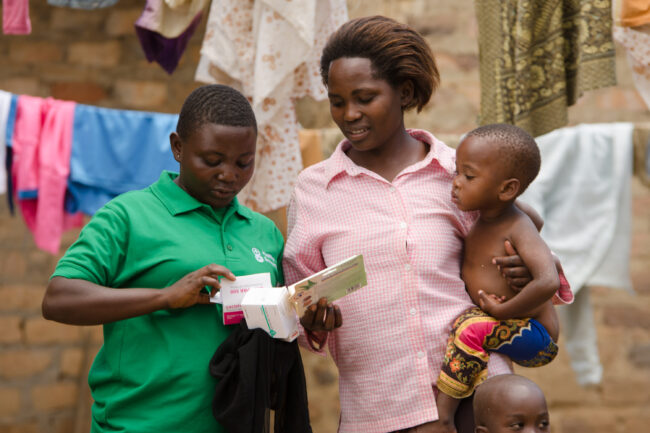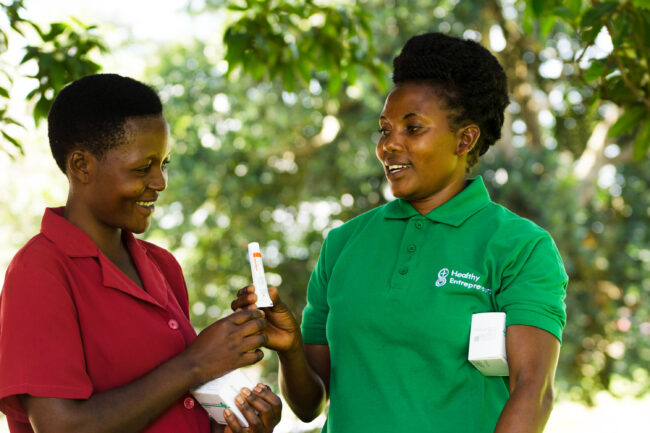Healthy Entrepreneurs (HE) is a social business where women (85%) and men (15%) become small business owners, selling essential (overthe-counter) medicines, health products and disseminating health information. HE’s business model addresses the persistent problem of the unpaid community health workforce and insufficient provision of health interventions to rural areas.
Note: Our funding agreement with Healthy Entrepreneurs concluded before the project’s completion. However, we are excited about the progress made and look forward to seeing continued success and impact in the future.
The Problem
The community health system is dysfunctional
Dysfunctional community health systems in Sub-Sahara Africa result in at least 3 million preventable deaths every year. Health is key in sustainable development and the economic potential of functioning health systems is immense. However, governments and international organizations have not succeeded in building effective and scalable community health systems that serve entire populations. Sub-Saharan Africa faces shortages in trained medical personnel.
In Uganda 85% of the population lives in remote and rural settings, far from health centres, that are generally understaffed and understocked. The public health system selects and trains Community Health Workers (CHWs) to fill this gap (180.000 nation-wide). Although CHW has great potential it currently is not effective, as most CHW are unpaid and lack resources. The level of care and presence of a CHW is inconsistent. The lack of standardization of CHW knowledge and training causes distrust. Community health systems are largely dominated by NGOs running similar, vertical and duplicative programs that often are volunteer based. As a result, most of the CHWs are unpaid and therefore unable to spend much time on health prevention and promotion. Because of their programmatic approach and dependency on donors, these programmes lack long-term funding, suffer from high attrition and miss out on sustainable impact. At this moment, only 13% of the CHWs in Sub-Sahara Africa receive some form of payment; the other 87% volunteers.
Efforts and resources towards development of an effective and sustainable community health workforce unfortunately lack efficacy. CHWs, most of them female, are trained, but no sustainable jobs are created.
The Solution
Increasing the financial and social position of women
The project aims for improved decency of the job, including additional focus on health, safety and investments for additional future income (pension). For all female CHEs, we strive towards increased female autonomy and agency over own income and a strengthened position and acceptance in the household and community. Investments in decent jobs and gender responsiveness leads to improved working conditions, loyalty and long-term commitment of CHEs and so drop-out numbers are low (< 5%).
Improving and sustaining the availability of healthcare products and services
These new and improved jobs improve and sustain the availability of healthcare products and services in remote and hard to reach areas serving 3.125.000 families (each CHE reaches 250 families). Through the network of CHEs we offer the final customers or patients a saving of more than 60% of their out-of-pocket expenses on primary healthcare. Their total estimated potential saving in the coming three years is $365million.
Another goal is the improved quality of the service provision by the CHEs as they have improved and strengthened their knowledge attitude and motivation which leads to an increase of recurring final customers and increase of income.
Current enrolment of youth in BTVET is too low in Uganda. Upgrading the sector can improve opportunities of decent employment for youth. This requires both improvement of quality and demand responsiveness of the education and awareness, as well as accessibility and signposting of youth towards BTVET. But in order to ensure clear pathways to employment are created (rather than ‘skilling for skilling’s sake’), the private sector should be actively involved in BTVET provision. This might be through collaborations that provide concrete on the job training (e.g., apprenticeships) and job placements (eg., through public-private co-operation).
Additionality
The value addition of the CFYE support is evident for HE. Both funding and TA are applicable for the four proposed strategies which are developed, implemented and monitored during the project.
Without CFYE funding HE is able to continue growing to a network of 9600 CHEs and add various districts the coming three years (while still remain financial sustainable). But, in order to attain a network that cover the entire country, franchising the concept is key. Only with replicators, who scale the solution further, is it possible to improve the lives of 11,431 health workers in a cost-effective, and efficient way.
The TA of Randstad for the selection and assessment of the potential replicators. Without the contribution of the CFYE we will miss 63% growth of new young CHEs and the time to reach a nationwide network of well- performing, paid CHWs/CHEs will be at least twice as long. The improvement of recruitment tools are critical for future expansion of the network.
For the decent job strategy, a proper assessment is required and recommendations for improvement on various levels (safety, training, skills, formalizing representation etc) are prerequisite for the right outcomes. With the TA of CFYE, the quality of the work will be better and the impact significantly higher.
The contribution of CFYE is critical for the gender responsive strategy. The TA will help to properly understand the gender component and develop the strategy. HE does not have the expertise today to transform HE from gender accommodating to gender responsive. HE is very keen to improve this aspect and our CHEs will be grateful.





